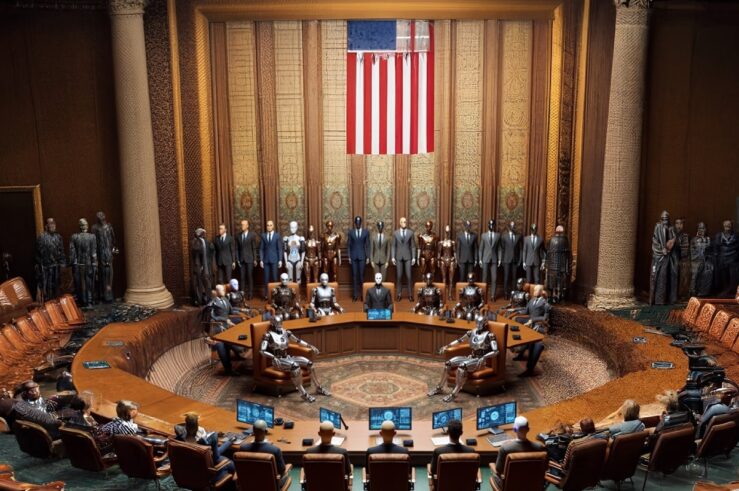Geoff recently highlighted AAG Christine Varney’s closing remarks at the Horizontal Merger Guidelines workshop and was fairly critical. Thom intervened to suggest that we at TOTM, while fairly critical of the agencies from time to time, also give credit where it is due — highlighting AAG Varney’s RPM article. OK, that’s enough credit for now.
Now, I’d like to highlight another portion of the speech Geoff mentioned that, as Commissioner Rosch has done in earlier remarks of his own, takes a shot at the Chicago School in order to justify greater intervention and a “reinvigorated” antitrust enterprise. On the one hand, it sure is nice to see convergence between the agencies compared to the days when Commissioner Kovacic described the sister agencies as “an archipelago of policy makers with very inadequate ferry service between the islands” and “too many instances when you go to visit those islands the inhabitants come out with sticks and torches and try to chase you away.” Ah. Nothing like attacking a vaunted enemy of interventionist antitrust policy like the Chicago School bogeyman to create warm feelings between the agencies. On the other hand, convergence would seem like a less impressive feat if what is converged upon is an embarrassing error that demonstrates a lack of understanding about the Chicago School in the first instance, and even still less impressive if the error is bootstrapped into justifications for policy changes.
What is all this about? In leveraging discussion of the financial crisis as the basis of an argument that microeconomic theory that forms the basis of industrial organization economics has been turned on its head, the chiefs of both antitrust agencies have now made the same error. I’ve criticized Commissioner’s Rosch’s error in declaring the Chicago School “on life support, if not dead” in great detail elsewhere. Antitrust is getting a little bit depressing. While the US enforcement agencies would have the Chicagoans on life support, or at least retired, of course, Professor Elhauge goes the whole way to “death of the single monopoly profit theorem.” All this talk about the Chicago School’s death, retirement, general malaise and otherwise fragile state and one almost forgets the state of Supreme Court jurisprudence, much less the actual empirical evidence.
Let’s turn to AAG Varney’s statement:
The evolution of antitrust law needs to keep pace with the advancement of economic thinking. Judge Posner convincingly made this case for reassessing economic beliefs in his recent, thought-provoking piece entitled “How I Became a Keynesian: Second Thoughts in a Recession,” wherein he questioned some of the theoretical assumptions that had previously guided his work. In an even more recent interview, he is quoted to say that “‘the term “Chicago School” should be retired.'” Theoretical assumptions that market forces naturally and inevitably correct for market failures clearly need to be reconsidered. In the context of the Horizontal Merger Guidelines, the most relevant aspect of this reassessment involves explicit or implicit assumptions that entry will erode market power otherwise enhanced by a merger.
Here’s the link to the interview. Varney clearly wants to use Posner’s quote about the retirement of the Chicago School to support the next sentence, that is, that we ought to reconsider our priors about markets working and reevaluate antitrust priorities in a way that supports greater intervention. I mean, if Chicago’s own Richard Posner says the Chicago School should be retired — well, I leave the rest of the proof as an exercise for the reader.
So did Posner And here’s what Posner actually said:
Ronald (Coase) is alive, but he’s very, very old. He’s not active. Stigler is dead. Friedman is dead. There’s Gary (Becker) of course. But I’m not sure there’s a distinctive Chicago School anymore. Except there are probably a higher percentage of conservative people here, but not all. Jim Heckman—not particularly conservative at all. He’s very distinguished. Steve Levitt—he’s very famous. I don’t think he’s conservative. You’ve got people like (Richard) Thaler. So probably the term “Chicago School” should be retired.
There were people—people like Stigler and Coase, Harold Demsetz, Reuben Kessel, and people at other schools like Armen Alchian. They were people rebelling against the very liberal economics of the nineteen-fifties—very Keynesian, very regulatory, very aggressive anti-trust, little faith in the self-regulating nature of markets. Francis Bator, who’s a very distinguished Harvard economist, he wrote a famous essay entitled “The Anatomy of Market Failure.” And he gave so many examples of market failure that you couldn’t believe a market could exist. You have to have an infinite number of competitors, full information, you can’t have any economies of scale, and so on. It was too austere. That was what the Chicago people, with their more informal approach, rebelled against. So we had our moment in the sun, but by the nineteen-eighties the basic insights of the Chicago School had been accepted pretty much worldwide.
Posner did not make the point that the Chicago School ought to be retired because it is outdated, incorrect, or led to antitrust policy that provided inadequate protection for consumers because of misguided notions about market failures. Posner was making the point, as he has made elsewhere time and time again, that the Chicago School as applied to regulation, antitrust, and industrial organization economics, had been so broadly adopted into mainstream economic thought that it no longer made sense to describe a distinctive “Chicago School.” This is the point he also makes in the speech. Posner, actually goes so far as to reject the assertion Varney invites the reader to make, i.e. that the financial crisis should undermine faith in markets in a sense relevant to regulation and antitrust generally.
When asked “Has the financial crisis undermined your faith in markets and the price system outside of the financial sector?”
Here is Judge Posner’s answer:
No. But of course one of the more significant Chicago (positions) was in favor of deregulation, based on the notion that markets are basically self-regulating. That’s fine. The mistake was to ignore externalities in banking. Everyone knew there were pollution externalities. That was fine. I don’t think we realized there were banking externalities, and that the riskiness of banking could facilitate a global financial crisis. That was a big oversight. It doesn’t make me feel any different about the deregulation of telecommunications, or oil pipelines, or what have you.
It really can’t be made more clear than that can it? I understand that it is tempting to use figures like Greenspan and Posner to play “gotcha.” I’m quite sure its even an effective rhetorical device at times with those who do not follow the debates closely or do not read the language carefully. But in both cases, the AAG and the Commissioner do a disservice to those lawyers and economists in their agencies who are dedicated to getting the answer right by hard economic analysis and not by sloganeering. For a serious and intellectually powerful discussion from a public antitrust enforcement official discussing the Chicago School’s role, along with contributions from Harvard, in forming the intellectual basis of modern antitrust jurisprudence, see Commissioner and former Chairman Kovacic’s seminal article on the subject.
As I’ve written on this topic previously:, at that time motivated by the declaration out of the Federal Trade Commission that the Chicago School was either on life support or dead:
I had always thought that the “Chicago School” stood for the proposition that microeconomic theory should be applied rigorously, with care and attention to institutional detail, and with an eye towards producing testable implications. These are qualities, especially empiricism, that do not lend themselves to a reflexive “faith” that markets will produce only efficient behavior. That faith, where it exists, is earned by persuasive theory and evidence.
And with all due respect to the Commissioner, an intellectually honest survey of the state of evidence concerning the actual competitive effects of antitrust-relevant business practices reveals that the Chicago School isn’t close to dead. In fact, Chicago School principles are alive as ever in the Supreme Court’s jurisprudence. Perhaps this disappoints the Commissioner and others who might like economics (and particularly Chicago School antitrust economics) to be a lesser constraint on antitrust enforcement decisions. But it’s the state of play in both the federal courts and in the empirical antitrust literature. The debate over whether to deviate from the state of play should be determined by the quality of theory and evidence. A rigorous review of the empirical evidence suggests not only that the Chicago School of antitrust is alive, but in my view, that it is the “best available” mode of analysis for understanding many business practices relevant to antitrust enforcement.
The search for evidence-based antitrust cannot be conducted by assertion. Instead, if it is to be fruitful, it must take a more scientific approach.
If the Chicago School’s influence on antitrust policy is going to be defeated — let it be by strong theoretical and empirical evidence that its insights give less predictive power than alternative theories and result in policies that provide fewer benefits to consumers than alternatives. T-shirt slogans are not going to reverse Supreme Court decisions or win Section 2 cases — though perhaps acts of Congress and expanded use of Section 5 will leave a dent. Still, here’s to authorities and leading voices in the antitrust community, and particular those at the antitrust enforcement agencies, using their podiums to encourage productive and intellectually honest debate and not cheap, deceptive, and misleading rhetorical tricks.




